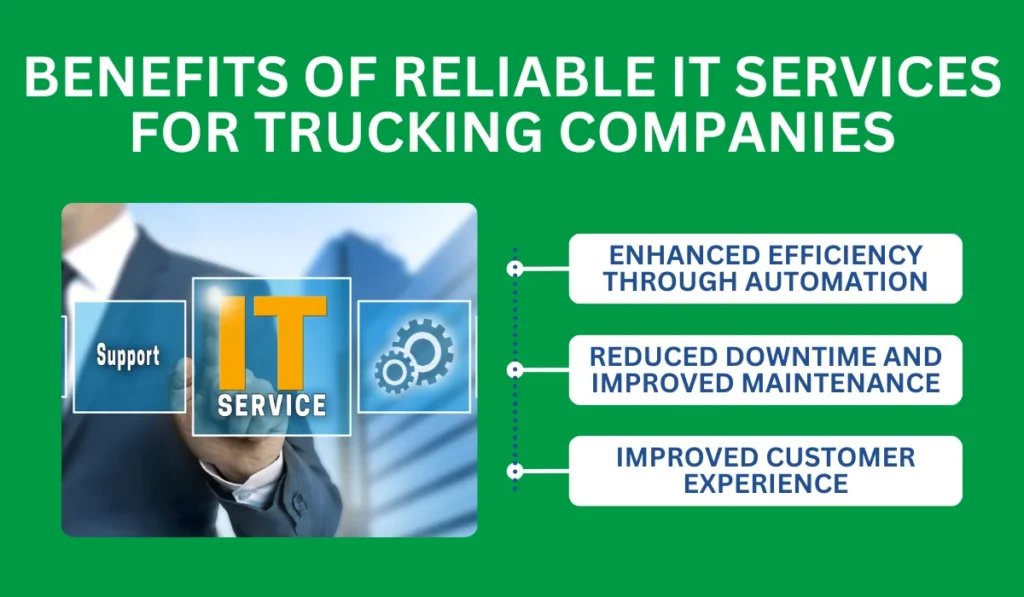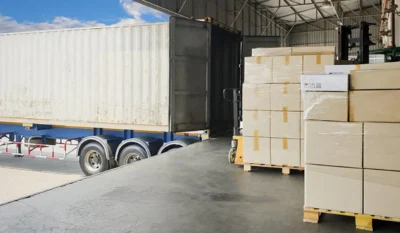IT downtime can cost companies thousands per minute—up to $22,000, according to Walden University. While that stat focuses on manufacturing, the same risk applies to trucking companies like yours. If you rely on technology to manage day-to-day operations, any disruption to your IT infrastructure can lead to lost revenue, missed deliveries, and dissatisfied shippers. In today’s fast-paced logistics industry, you must have reliable IT services to stay ahead of competitors and maintain consistent profitability.
Investing in cutting-edge IT solutions can streamline processes, minimize downtime, and protect sensitive data. From fleet tracking to customer updates, reliable IT systems keep your business running smoothly. This article explores why every trucking business should prioritize dependable IT support, from boosting operational efficiency to safeguarding valuable assets.
The Role of IT Services in the Trucking Industry
Digital Transformation in Trucking
Trucking has rapidly evolved thanks to digital transformation and rising demand for efficiency. As companies race to adopt new technologies, basic IT infrastructure might no longer be enough to stay competitive. Embracing cutting-edge tools—such as cloud-based management systems—lets you connect with partners, optimize routes, and handle large volumes of data more accurately.
Staying competitive also means reducing manual tasks and paper-based processes. By leveraging modern IT services, you can automate workflows like document handling, invoicing, and even factoring, making the flow of information faster and less prone to human error.
IT Solutions for Fleet Management
Fleet success depends on real-time visibility. Timely deliveries depend on accurate data—vehicle location, driver behavior, and maintenance alerts. Integrating telematics and advanced transportation management tools gives you a transparent overview of your entire fleet. TMS (Transportation Management Systems) is beneficial in route planning and maintenance scheduling, reducing operational bottlenecks.
Real-time tracking also fosters trust with shippers who appreciate immediate notifications on shipment status. As you adopt robust IT solutions for fleet management, your drivers can avoid delays, optimize fuel card usage, and maintain compliance with regulatory measures such as electronic logging devices (ELDs).
Benefits of Reliable IT Services for Trucking Companies

Enhanced Efficiency Through Automation
Reliable IT services help you automate essential workflows like dispatching, invoicing, and compliance reporting. For instance, ELD technology automates hours-of-service tracking, eliminating the need for manual logs and significantly reducing errors. Automation cuts admin time and helps you adapt to changing demands.
Using software solutions to automate tasks can also free up time for strategic planning. Instead of allocating resources to repetitive tasks, you can focus on growing your trucking business, improving customer experience, and fine-tuning your transportation management strategies.
Reduced Downtime and Improved Maintenance
When your systems run smoothly, you avoid costly downtime that can derail operations. Modern management software, coupled with predictive maintenance tools, helps you schedule repairs and upkeep more effectively. By implementing maintenance scheduling protocols, you can ensure that vehicles receive attention before problems escalate, protecting both safety and profitability.
For example, a sudden mechanical issue mid-route can create delays or missed deliveries. With advanced IT services, you receive real-time data on engine performance, fuel consumption, and potential wear, letting you address concerns proactively.
Improved Customer Experience
Customer experience can make or break your reputation. If your systems fail, shipments are delayed, and your customers lose faith in your ability to deliver. Conversely, real-time notifications and transparent tracking give shippers peace of mind by letting them monitor cargo at every step. Investing in reliable trucking software simplifies status updates, builds trust, and encourages repeat business.
If you’re an owner-operator juggling everything, seamless systems help you stay efficient and competitive. With easy-to-use management systems, smaller outfits can match the efficiency of larger enterprises, serving customers quickly and accurately.
Key IT Tools for Modern Trucking Businesses
Transportation Management Systems (TMS)
A good TMS helps you plan better routes, manage costs, and improve supply chain visibility. With a unified dashboard, you can plan routes that reduce fuel consumption and driver fatigue, manage capacity more effectively, and even automate freight billing. This minimizes operational costs and boosts your ability to serve customers swiftly and reliably.
Having all transportation management data in one place allows you to refine scheduling, improve load planning, and better track essential documents.
Cybersecurity Measures
With rising cyberattacks, cybersecurity is non-negotiable. As a trucking company, you handle sensitive information such as customer details, driver records, and financial reports. A robust cybersecurity strategy protects you from devastating attacks that could compromise your business operations. An experienced IT service provider can implement multi-layered security protocols, including firewalls, encryption, and continuous monitoring.
Investing in cybersecurity protects internal data and assures shippers and partner organizations that their information remains safe. Given the complexities of modern logistics, failing to prioritize security can hurt your reputation and potentially result in costly lawsuits or regulatory fines.
Mobile Apps and Software Solutions
Mobile technology has reshaped how truckers interact with dispatchers, routes, and resources. A dedicated mobile app can provide real-time route updates, estimated arrival times, and fuel card advantages. You also gain immediate insight into factoring options or load availability, which is especially beneficial for owner-operators navigating competitive markets.
Many trucking software packages let drivers easily update logs, capture electronic signatures, and handle urgent documentation from the road. These software solutions reduce manual errors and enable consistent communication between drivers, dispatchers, and customers.
Choosing the Right IT Service Provider
Factors to Consider
Choosing the right IT partner matters. When searching for a service provider, you need expertise in the logistics industry, familiarity with trucking software, and the ability to scale solutions as your business grows. Look for a partner that offers proactive maintenance and 24/7 IT support. This ensures you won’t face prolonged downtime that hinders your workflow even if issues arise at odd hours.
It’s also wise to ask about the provider’s track record with management systems, especially if you adopt cloud-based platforms. Confirm they’re adept at Microsoft integrations, mobile app development, and any specialized software or hardware you rely on.
Cost vs Value
Some companies hesitate to invest in professional IT services due to concerns about pricing. However, you must weigh these costs against the long-term savings. Increased profitability often stems from improved operational efficiency, minimized downtime, and better resource allocation. A single data breach or extended system outage can be far costlier than any monthly IT fee.
Looking at long-term value—not just upfront cost—helps justify investing in IT support. For instance, implementing advanced route planning or maintenance scheduling can reduce unnecessary fuel usage and keep vehicles on the road longer, translating to more revenue opportunities.
The Future of IT in the Trucking Industry
Emerging Trends
AI-driven route planning and predictive analytics are changing how freight is moved. These advancements help you accurately forecast demand, reduce empty miles, and optimize driver schedules. As the industry moves forward, next-generation ELD devices and cloud-based platforms enable you to keep pace with technology without massive in-house investments.
In addition, new trucking software focuses on specialized verticals, including healthcare transportation or hazardous material hauling, showing the flexibility and breadth of solutions available. Staying updated on these innovations helps you maintain an edge in an industry where efficiency is paramount.
The Role of IT Strategy
A solid IT strategy ensures you stay adaptable, whether integrating software solutions, adopting factoring options, or migrating to cloud-based management software. Proactive planning allows you to anticipate market changes and refine operations before competitors. Clear IT goals help you align tech investments with growth and stay ahead of disruptions.
When you embrace cutting-edge tools and continually refine your IT infrastructure, you position your organization for long-term success. Proper strategy doesn’t just solve immediate problems—it prepares you for future disruptions and opportunities.
Conclusion
At Keystone Technology Consultants, we’re dedicated to helping your trucking business harness cutting-edge IT solutions to minimize downtime, streamline operations, and drive long-term growth. Our experienced team understands the unique demands of the trucking industry. It offers tailored services to enhance profitability, safeguard sensitive data, and keep your fleet running at peak performance.
Don’t let outdated systems hold your business back. Let Keystone Technology Consultants help you take control with smarter, more reliable IT. Reach out today to minimize downtime, streamline operations, and future-proof your trucking company in a rapidly evolving digital landscape.



